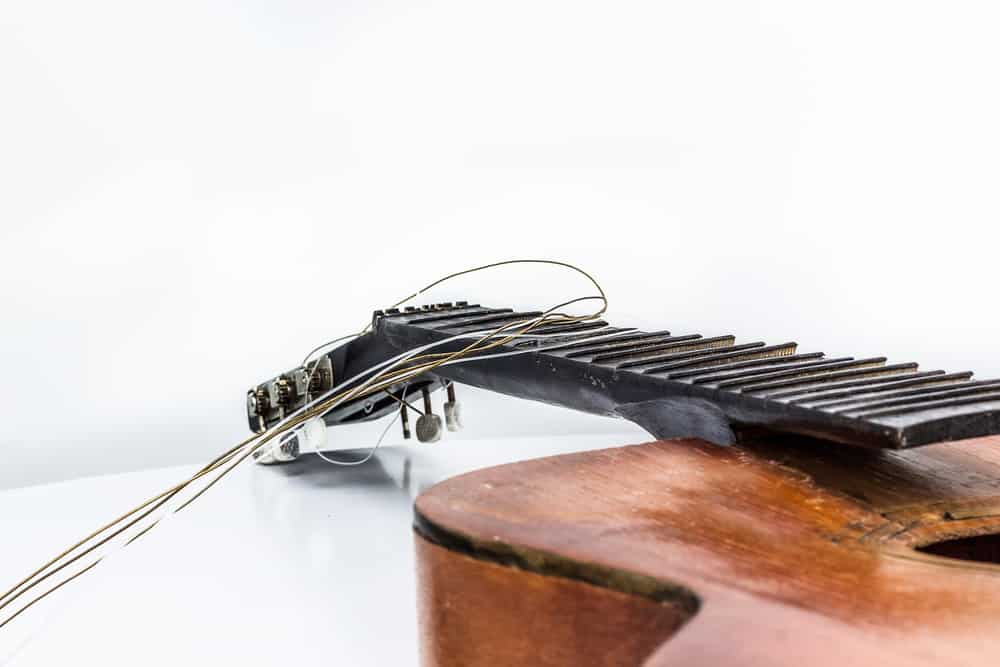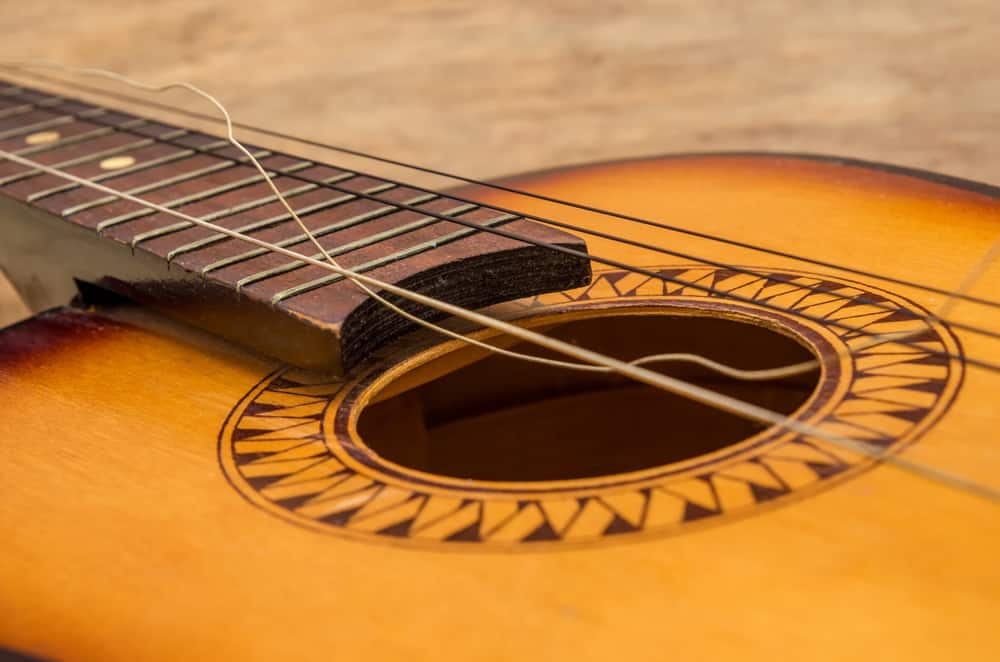
We all know the feeling when you’re fully set and ready for a session, and all of a sudden, you hear the jarring sound of your guitar string snapping into two. The worst thing about broken guitar strings is that they happen at the most unpleasant times.
That particular moment when you need them the most is when they’ll choose to fail you. But have you ever sat and wondered why they break?
Why do guitar strings break?
Generally, the steel in guitar strings contains iron that rusts when exposed to oxygen(oxidation). This can lead to weakness in some parts of the string, forcing it to break. Sharp bridges, rough fret edges, burred tuning posts, and heavy picks can also cause a string to break.
Here, we’ll look deep into some of the primary reasons why millions of guitar strings break every year. In addition, we’ll be sharing some vital tips on how you can prevent yours from breaking all the time.
Most Common Reasons Why You Keep Breaking Guitar Strings

There are so many reasons why your guitar strings keep breaking. Here are some of the major ones and how you can prevent them.
Oxidation
Oxidation is the most common cause of guitar strings breakage, and it primarily affects old guitar strings.
Guitar strings are usually made of steel, containing a great deal of iron. Iron rusts when exposed to moisture, causing the guitar string to lose its flexibility and eventually break.
Sweat from our palms or moisture and dirt from the places we store our guitar can cause the string to rust faster. Even humidity can play a significant role.
Though it’s practically impossible for your guitar strings to last forever, you can prolong their lifespan with proper management. The strings are bound to wear out, but if you constantly clean your guitar strings, especially after playing, you won’t worry about them wearing off for a long time. There are lots of string cleaning tools to help you with this.
Also, It’s advisable to store your guitar in dry places. Avoid storing your guitar in your basement or leaving it in your trunk. These places have high humidity and can have adverse effects on your strings.
Avoid storing your guitars in humidity outside the 30-70% range.
Guitar Components
Nuts
If you discover that your guitar strings keep breaking close to the nuts, there’s a high chance that your nuts are poorly fitted, or your string grooves/slots have accumulated lots of dirt. It’s also possible that the string grooves are worn out due to heavy gauge strings moving back and forth.
Also, if you’ve been using high gauge strings on your guitars and recently switched to low gauge strings, the free movement of the string in your guitar’s big slot can cause them to break.
You can stop your guitar’s nut from wearing out by using lubricants during string changes. For worn-out nuts, file them with a filer or sandpaper to remove all sharp edges that can snap the guitar strings.
Tuning Pegs
Tuning posts can have rough edges where the guitar’s string passes, leading to breakage. Dirt in the tuning posts can also cause breaking and even make your guitar harder to tune.
You can use an old wound string or cotton swab to smoothen the hole to fix this.
Bridges
After oxidation, saddles are the leading cause of breakage in guitar strings. Once the saddles get too sharp, they break the string. The breaks mainly occur very close to the bridge.
If you notice your guitar strings have been breaking close to the bridge, use sandpaper or file to level those stubborn sharp edges so that the strings can move freely in the saddle.
Your Playing Style
Are you the type that puts your whole energy into the guitar when your play? Do you pluck the strings so hard simply because you can’t resist the urge? If your answers are yes, you’ll probably have to change your guitar strings often.
Plucking the guitar strings too hard will create a great deal of tension on the strings. Over time, this excessive tension can lead to loss of flexibility and breakage.
Lead guitar players and people who use whammy bars will also see their strings break a lot.
To fix this, try changing your playing technique. Most beginners fail to understand that plucking the strings hard doesn’t necessarily mean you’ll produce better sounds. In fact, your quality of sound reduces the harder you pluck.
Using The Wrong Guitar Strings
Guitar Strings are designed to take a great deal of tension, so breakages are usually due to the other factors listed above. However, the guitar string you’re using must be compatible with your tuning and guitar.
For example, an alternate tuning with standard strings will heap too much tension on some strings, causing breakage.
Avoiding this is very simple; always use the right strings. If you are going for open tuning, find custom strings that allow equal tension on all strings. For standard tuning, using balanced strings will prevent breakage.
The Bottom Line
You can’t play the guitar without strings, so it’s important you understand why they break and how to prevent these breakages.
The rusting of the steel is the most common reason for string breakage, especially for old and poorly kept guitars. The problem can also come from a poorly fitted nut, burred tuning posts, or an overly sharp saddle.
In some cases, you can break the guitar strings from plucking too hard or using the wrong strings.
Lastly, with proper maintenance of your guitar strings, you can prevent most factors that cause them to break. Though a string will naturally wear off over time, good maintenance will prolong its life span.
Frequently Asked Questions
Four months. A standard guitar string should be able to give you 100 hours of playing time before they begin to wear out.
Don’t do this unless you plan to store the guitar for over six months.









